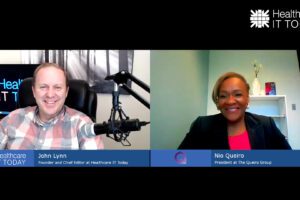Being a healthcare CIO can be very stressful. There are an endless amount of problems that you are being tasked to find solutions for, endless amounts of technology to look into and consider for your organization, and endless considerations on how to make your organization better for both your employees and your consumers. So at the recent CHIME 2023 Conference, we thought we’d commiserate a little bit on some of the challenges CIOs are facing and see if we could maybe find some solutions along the way! We asked some of our brightest friends what they thought was the biggest challenge facing CIOs today and what can be done about it. The video below is a compilation of their answers!
Jason Griffin, Head of Digital Health Strategy at Nordic – I think the more technology debt that we’re taking on and the more digital strategies that are being implemented, it’s even more incumbent upon our technology leaders to help the organizations understand the organizational change management that needs to come with that new technology. That is a daunting task, to change those long-lasting and well-entrenched processes and procedures that have just gone on for a long time and you can’t just layer technology over top of that. So I think for our technology and CIO leaders, and even our CSOs, their main goal is to help their organizations understand the value of that technology and how to really operationalize that technology in their environments.
Khalid Turk, Healthcare CIO at County of Santa Clara – The information security – all the threats that are clear and present every day. That’s what keeps us up every night, we need to make sure that we stay a step ahead of the bad actors. That’s what’s most important – that’s what’s number one. Number two I think that is the people. From my leadership, I always make the people the center of my strategy. So I have to make sure that we continue to hire the right resources, train them appropriately, and retain them. Number three is the technical debt. In the healthcare industry, we have a lot of older systems and older technology. In the past three years, since the focus has been mostly dealing with the pandemic we have a lot of technical debt that needs to be dealt with, which means retiring some old systems and doing the cloud migration where necessary.
Inderpal Kohli, CIO at Englewood Health – I think where we are in healthcare is on the cusp of transformation. So really the transformation, the growth which leads to more business, transforming the patient care, and really creating efficiency is where most of us are facing the challenge. What can be done about it? I think the best way to do it is if it’s woven into the organizational strategy. Then you really get the buy-in because technology happens to only be 40% of it. Really the remaining 60% is your operational alignment – that’s what we’re learning with digital transformation and that’s what we’re going to learn with all our AI-generated transformation.
Chris Sullivan, Global Strategy Lead at Zebra Technologies – I think the biggest challenge is the mismatch between demand for their services and budget and resources within the group. Economics in hospitals are shrinking or challenged currently as everyone knows, yet the demand for IT services and CIO services is exploding in growth. This is very difficult so the answer has to be efficiencies, consolidation, doing more with less, not getting consumed completely by operational tactics, and being a leader in the organization at the same time.
Alok Sharma, Chief Operating Officer at 314e Corporation – I think the two most important ones are retaining and hiring healthcare IT resources. I think there’s just so much competition right now, that you have to provide better benefits. COVID has introduced this whole thing of working from home, and people have gotten used to it, so I think that flexibility has to be provided to the right people. Also a lot of training, mentorship, and some career guidance, which I think is missing right now. The other challenge is physician burnout and turnover due to EHR usage and burden. AI and technology are really what can help with that. You can provide scribes for documentation, some robotic process automation, AI-assisted tools for physicians, and some programs that talk to them about burnout and how to solve that.
Jennifer Johnson, Director of Healthcare Sales and Strategy at Connection – What our customers tell us all the time, very very privately, is that they’re so worried about their data. Nobody feels great about their data hygiene and I think they’re really afraid to have those conversations with their key stakeholders because it shows some vulnerabilities and there are so many priorities right now. They only have so much time to take a look at that data hygiene, and yet, foundationally, if you don’t get that data right you can’t get any of the other things off the ground. So data just remains absolutely critically important to our CIOs.
Erik Pupo, Director of Commercial IT at Guidehouse – Right now, a lot of it’s cost pressure, a lot of it’s margin improvement, and a lot of it’s financial. We work a lot with CIOs and the number one thing they tell us is we’re just trying to deal operationally and financially with all of the challenges hospitals are dealing with as well. IT operations – big, big, challenge for them. Getting good managers, being able to run projects, being able to track ROI, measuring the success of IT because there’s a lot of new technologies, a lot of AI talk, a lot of automation talk, you hear all that for cybersecurity, and all that’s money but all of it needs to be traced, needs to be tracked in terms of dollars but also performance.
Tom Liddell, CEO at Harmony Healthcare IT – The number one thing we’re seeing in the shortest-term are budget constraints with respect to the expense they have to manage to maintain all the software applications to support this massive enterprise. So in the short term the enormous growth in data that’s driving cost in that vector of management of those systems.
Kel Pults, DHA, MSN, RN-BC, Chief Clinical Officer at MediQuant – I think the biggest challenges are probably security, so the easiest piece with security is to reduce the IT footprint – getting rid of disparate systems, reducing as many down to a smaller number that you can close gaps and really identifying where the breach areas are found.
Clay Ritchey, CEO at Verato – If you think about the trajectory of healthcare CIOs, their job used to be around delivering solutions that make good partnerships with clinical work, so how do we use technology to help deliver care in a better way? I really see the next challenge is, now that we’ve adopted digital healthcare across the EHRs, thinking about how to become a better partner to the business. How do they help the business grow, how do they help the business have the insights they need to operate at a lower cost and better care, really seeing that CIO playing a more strategic role.
Huge thanks to Jason Griffin, Head of Digital Health Strategy at Nordic, Khalid Turk, Healthcare CIO at County of Santa Clara, Inderpal Kohli, CIO at Englewood Health, Chris Sullivan, Global Strategy Lead at Zebra Technologies, Alok Sharma, Chief Operating Officer at 314e Corporation, Jennifer Johnson, Director of Healthcare Sales and Strategy at Connection, Erik Pupo, Director of Commercial IT at Guidehouse, Tom Liddell, CEO at Harmony Healthcare IT, Kel Pults, DHA, MSN, RN-BC, Chief Clinical Officer at MediQuant, and Clay Ritchey, CEO at Verato for taking the time out of their day to come and speak with us! And thank you to all of you for taking the time to read this article and watch this video! We couldn’t do this without all of your support. What do you think is the biggest challenge facing CIOs today and what can be done about it? Let us know either in the comments down below or over on social media. We’d love to hear from all of you!













